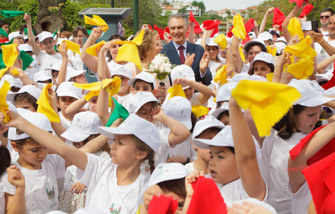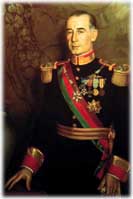
 Francisco Higino Craveiro Lopes
Francisco Higino Craveiro Lopes
Born in Lisbon on 12 April 1894 and died in Lisbon on 2 September 1964.
Son of João Carlos Craveiro Lopes and Júlia Clotilde Cristiano Craveiro Lopes, a family of military tradition. His father fought in Flanders and was taken prisoner at Lys during World War I. He was a soldier of the New State regime, Governor-General of India and commandant of the 1st Military Region. Married Berta Ribeiro Artur and had four children.
ACADEMIC CAREER
Attended the Military School and graduated on 23 July 1911. Attended Lisbon Polytechnic School.
OFFICES HELD PRIOR TO THE PRESIDENCY OF THE REPUBLIC
In 1911, enlisted as a volunteer in the 2nd Cavalry Regiment. As a 1st sergeant cadet attended the cavalry course at the former Army Academy and then joined Military Aeronautics.
In 1917 took the military pilot course at the French school of aviation in Chartres, and was promoted to lieutenant.
In March 1922 was a flying instructor as Flying Captain. In 1926 he was posted to Military Aeronautics and appointed head of the Teaching Division of the Military School, where he stayed until 1929. For short periods he again held this post in 1932 and later in 1939.
In 1930, by now a major, he worked as head of division of the cabinet of the Governor-General of India.
From 1933 to 1934 he was chef de cabinet of the Governor-General of India, which position he again held in late 1936. In 1934 he was acting governor of the district of Damão and later confirmed in his post with the rank of superintendent. In 1936 he was actually in charge of the Government General of India.
In 1939 with the rank of lieutenant colonel, commanded Tancos Air Base.
In 1943 took the Altos Comandos course and was called to teach at Instituto de Altos Estudos Militares.
Between 1944 and 1950 was general commandant of the Portuguese Legion.
From 1945 to 1949 elected by the district of Coimbra as representative in the National Assembly, combining this position with that of commandant of Terceira Air Base.
In 1945, promoted to brigadier. In 1949, promoted to general. In 1951, appointed commandant of the 3rd Military Region, combining this position with his teaching at Instituto de Altos Estudos Militares. On 21 July 1951, elected President of the Republic.
His term ended in July 1958 and although he intended to run again, the União Nacional supported Américo Tomás instead.
ELECTIONS
He fought the election campaign as the União Nacional candidate.
Admiral Quintão Meireles was the democratic and republican candidate.
Professor Luís Gomes was the communist party candidate but was considered not competent and therefore ineligible by the Supreme Court under Law nº 2048 of 11 June 1951, which introduced new alterations to the 1933 constitutional text.
Admiral Quintão Meireles had forcibly to withdraw his candidacy on the eve of the elections.
So, there were no opponents and Craveiro Lopes won with about 80 % of the votes cast.
MAIN WORKS PUBLISHED
Published no specific works.
The only text he is known to have written was a preface to the work of Manuel José Homem de Mello, Portugal, o Ultramar e o Futuro, Lisbon, author’s edition, 1962.
Recent publications include Cartas de Salazar a Craveiro Lopes 1951-1958, prefaced and coordinated by Manuel José Homem de Mello, Lisbon, Edições 70, 1990.
A man whose family had a great military tradition going back to the 19th century. His great-grandfather, his grandfather and his father were all great soldiers.
It was therefore understandable that Francisco Higino Craveiro Lopes should also have joined the army.
Craveiro Lopes’s name as the candidate for the Presidency of the Republic came about by accident. A successor was needed for Marshal Carmona at a delicate political moment. The military were restless and so was the opposition. Frequent mention was made of replacing Salazar.
At the time Craveiro Lopes was unknown but had an excellent record sheet. He had great personal integrity, was loyal and free of political manipulation. From the point of view of the regime Craveiro Lopes was possibly the right man to obtain the consensus of the opposition.
Proposed by the União Nacional he was the only candidate to the Presidency as Ruy Luís Gomes was rejected and Quintão Meireles withdrew.
When he was elected no-one thought that this would be a problematic Presidency and a real embarrassment to the regime. Problems started immediately.
Relations between Craveiro Lopes and Salazar were always cold and formal. Their temperaments could never have led to friendly relations, although there could have been some empathy, which was never the case.
As the years went by Craveiro Lopes felt increasingly humiliated. His speeches were altered, his projects rejected or postponed, his summons to the Government ignored.
Here was a man who was not used to being merely decorative and to playing a passive role, with no direct and visible acts. As a soldier he was used to acting.
In his work Minhas Memórias de Salazar Marcelo Caetano analyses his personality and mentions that he had not been cut out for such duties, the duties of a moderator, with no initiative or governing role. He was merely a symbol of national unity and the guardian of the institutions.
In the meantime the opposition began circling the President.
They believed that there was hope for change with Craveiro Lopes.
By means of letters, meetings and audiences he was informed of what was going on in the country. They spoke of censorship, of the restrictions on meetings, of the suffrage issue, etc.
On the other hand, the regime had never wanted a President who wished to rule or even to have an active role. The situation was becoming too dangerous. A solution had to be found before things got out of control. Gradually, the regime conveyed a negative image of Craveiro Lopes to justify his replacement at the right moment.
The regime conveyed the idea of an inflexible, rigid and inaccessible President. He was considered as being linked to the opposition, as a man prepared to replace Salazar. Mário de Figueiredo was instrumental in recounting a so-called private conversation that Craveiro Lopes had had with him.
It was 1958 and as established in the Constitution, time for new presidential elections.
Craveiro Lopes hoped for a second term in office and Humberto Delgado had actually stated that he would not run if the President did.
But the União Nacional chose Américo Tomás and Craveiro Lopes was set aside.
That same year he was raised to the rank of marshal. Compensation, perhaps? Or a way of demanding his loyalty? In any case, this distinction was usually awarded to Presidents of the Republic. However, his involvement in the attempted military coup of 13 April 1961 was a concrete demonstration of his position.
© 2006-2016 Presidency of the Portuguese Republic
You have gained access to the records of the Official Site of the Presidency of the Republic from 9 March 2006 to 9 March 2016.
The contents available here were entered in the site during the 10 year period covering the two mandates of President of the Republic Aníbal Cavaco Silva.